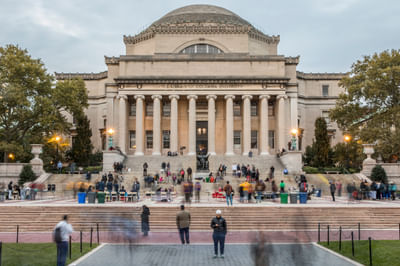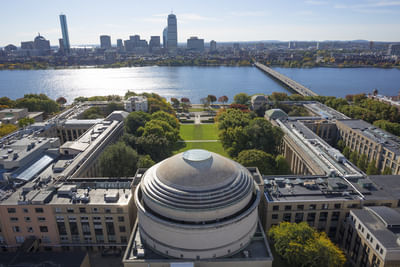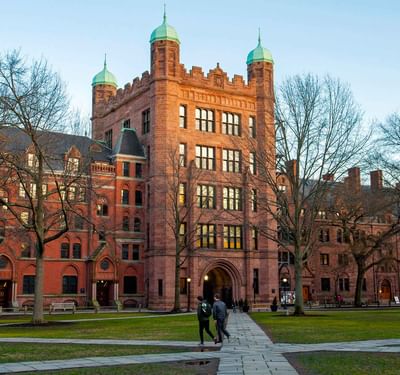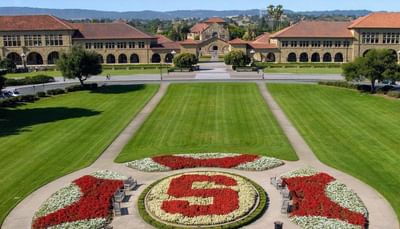Study in United States

The United States has emerged as a premier study abroad destination, attracting millions of international students each year. Renowned for its diverse academic offerings, the U.S. boasts over 4,000 higher education institutions, including prestigious universities like Harvard, MIT, and Stanford, which are recognised globally for their commitment to academic excellence and research innovation.
The country's cultural diversity enriches the educational experience, allowing students to engage with various perspectives and backgrounds. Additionally, the U.S. education system offers flexible learning options, enabling students to tailor their studies to fit their interests and career goals. With robust support systems for international students and ample opportunities for networking and professional development, studying a Masters degree U.S, provides a comprehensive platform for personal and academic growth.
|
Aspect |
Details |
|
Diverse Academic Programmes |
Over 4,000 higher education institutions offer a wide range of fields. |
|
Global Recognition |
Home to many of the world's top-ranked universities, such as Harvard and MIT. |
|
Cultural Diversity |
A melting pot of cultures, enhancing the learning experience and personal growth. |
|
Research Opportunities |
Significant funding and resources for research across various disciplines. |
|
Work Opportunities |
Options for on-campus employment and internships, with potential for OPT (Optional Practical Training) post-graduation. |
|
Support Services |
Comprehensive support systems for international students, including orientation and counselling services. |
|
Campus Life |
Vibrant campus life with numerous extracurricular activities and student organisations. |
Why Study In The USA?
Here are some compelling reasons why Masters in USA for Indian students is a top choice:
- High-Quality Education
- The USA is home to many of the world’s best universities, renowned for their Masters degree courses in the USA that provide academic excellence and innovative teaching methods.
- Diverse Cultural Environment
- Experience a melting pot of cultures that enhances learning and fosters personal growth, allowing students to engage with various perspectives.
- Flexible Curriculum
- Many American universities offer a flexible curriculum, enabling students to explore different subjects before declaring a major.
- Research Opportunities
- Access to advanced research facilities and significant funding for various disciplines, encouraging innovation and discovery.
- Internships and Co-op Placements
- Programmes often include opportunities for internships, providing valuable real-world experience that enhances employability.
- Career Opportunities
- The strong U.S. economy presents ample job opportunities for graduates, both locally and globally.
- Comprehensive Support Systems
- Universities provide extensive support for international students, including orientation programmes, counselling services, and academic advising.
- Vibrant Campus Life
- Engage in numerous extracurricular activities, clubs, and organisations that enrich the student experience and foster community connections.
Why USA for Masters is because it not only equips students with academic knowledge but also prepares them for successful careers in an increasingly interconnected world.
Intakes In The USA
In the USA, universities typically offer three main intakes for international students: Fall, Spring, and Summer. Here’s a breakdown of each intake:
1. Fall Intake
- Timing: Starts in August or September.
- Popularity: This is the largest and most popular intake, with the highest number of programmes and universities participating.
- Advantages:
- A wide range of courses available across various disciplines.
- More opportunities for scholarships and financial aid.
- Greater chances for part-time jobs and internships during breaks.
2. Spring Intake
- Timing: Begins in January.
- Availability: Fewer programmes and universities compared to Fall, but still a viable option for those who missed the primary intake.
- Advantages:
- Smaller class sizes can lead to more personalised attention.
- Less competition compared to Fall intake.
- More time to prepare application materials.
3. Summer Intake
- Timing: Starts around May.
- Characteristics: This intake is less common, with limited programmes and universities offering courses.
- Advantages:
- Reduced competition for admission.
- Opportunity to start studies sooner if the Fall intake was missed.
Application Deadlines
- For the Fall intake, applications are typically due between November and May.
- For the Spring intake, deadlines usually fall between September and October.
- The Summer intake has varying deadlines depending on the institution.
Each intake offers unique benefits and opportunities, allowing students to choose based on their academic readiness and career goals. It’s essential for prospective students to research specific universities and their offerings to make informed decisions.
Available Courses To Study
The United States is known around the world for its high educational standards, and degrees earned there has a strong international reputation.
You'll have thousands of schools and courses to choose from, as well as the chance to widen your cultural horizons by participating in American campus life. You can choose from a wide range of university courses USA offered by some of the world's greatest institutions. When it comes to short or long term courses, the United States has a lot to offer.
Finances
Cost of Education
The cost of studying in the USA varies widely depending on the type of institution, degree programme, and location. Here’s a summary of the key expenses:
- Public Universities:
- Undergraduate: $8,000 - $35,000 per year
- Masters: $10,000 - $35,000 per year
- Private Universities:
- Undergraduate: $25,000 - $55,000 per year
- Masters: $22,000 - $50,000 per year
Average Annual Costs for Specific Programmes
- Bachelor's Degree: $20,000 - $50,000
- Masters Degree: $15,000 - $40,000
- MBA: Up to $70,000 at top institutions
Cost Of Living
The cost of living in the USA for international students varies significantly based on location, lifestyle, and personal choices. Here’s a detailed overview based on recent information:
Average Monthly Costs
- Estimated Living Expenses: $1,000 to $1,500 per month.
- Annual Living Costs: Approximately $10,000 to $25,000 per year.
Major Expense Categories
- Accommodation:
- On-Campus Housing: $9,800 to $11,100 per year.
- Off-Campus Rent: Ranges from $150 to $4,500 depending on the city.
- Example Monthly Rent:
- New York City: $3,500 - $4,500
- San Francisco: $4,000 - $4,500
- Austin: $2,000 - $2,500
- Utilities:
- Average monthly utilities (electricity, heating, cooling): $100 to $150.
- Food:
- On-Campus: Approximately $250 per month.
- Off-Campus: Ranges from $400 to $600 per month.
- Transportation:
- Public transportation costs around $50 to $150 per month.
- Owning a car can add an average of $300 to $700 monthly.
- Health Insurance:
- Typically costs between $700 and $1,100 per year.
- Miscellaneous Expenses:
- Entertainment: Approximately $80 to $100 per month.
- Phone and Internet: Around $50 to $80 for phone plans and $45 to $50 for home internet.
City-Specific Examples
- High-Cost Cities:
- Los Angeles: ~$4,000/month
- Boston: ~$3,316/month
- New York City: ~$3,300/month
- More Affordable Cities:
- Atlanta: ~$2,200/month
- Philadelphia: ~$1,300/month
- Texas cities (e.g., Dallas): ~$2,000/month
The overall cost of living in the USA for students can vary widely based on factors such as location and lifestyle choices. It's crucial for international students to budget effectively and consider their housing options carefully to manage expenses while studying abroad.
Cost Of Studying In United States
Interest rates as low as 8.9% *
Avg. on-campus living expense $32,892
250K+
Students Assisted
800Cr+
Loan Amount Disbursed
5000+
Loans Sanctioned
Admission Process
Studying in the USA is a popular choice for international students, but it comes with specific admission requirements that vary by institution and programme level. Here’s a concise overview of the key requirements:
- Academic Qualifications:
- Undergraduate Programmes: Completion of secondary education (high school diploma or equivalent).
- Graduate Programmes: A bachelor's degree or equivalent from an accredited institution.
- Standardised Tests:
- Undergraduate: SAT or ACT scores are often required.
- Graduate: GRE or GMAT scores are typically needed for master's programmes, depending on the field of study.
- English Language Proficiency:
- Most universities require proof of English proficiency through tests such as TOEFL or IELTS, with minimum score requirements varying by institution.
- Application Materials:
- Transcripts from previous educational institutions.
- Letters of Recommendation (usually 2-3).
- Statement of Purpose or Personal Statement outlining academic goals and motivations.
- Resume or CV detailing relevant experiences.
- Financial Documentation:
- Proof of sufficient funds to cover tuition and living expenses, often required during the visa application process.
- Application Fee:
- Most universities charge a non-refundable application fee, typically ranging from $50 to $250.
Additional Considerations
- Deadlines: Application deadlines can vary; early applications are often recommended, especially for competitive programmes. Common deadlines range from October to March.
- Visa Requirements: After acceptance, students must apply for an F1 Study Visa for the USA which requires proof of admission and financial support.
This structured approach to admissions ensures that prospective students are well-prepared for their academic journey in the USA.
How to Apply To University In USA
1. Research and Select Universities
- Identify universities that offer programmes aligned with your academic and career goals, considering factors like location, ranking, and tuition fees. As daunting as this task may seem, UniScholars is here to help. Our experts carve out the most suitable universities for you, and more.
2. Prepare Required Documents
- Academic Transcripts: Provide transcripts from previous educational institutions.
- Standardised Test Scores: Take required tests such as the SAT or ACT for undergraduate programmes, or GRE/GMAT for graduate programmes.
- English Proficiency Tests: Submit scores from tests like TOEFL or IELTS if English is not your first language.
- Personal Statement/Essays: Write essays that reflect your motivations and suitability for the programme.
- Letters of Recommendation: Obtain recommendations from teachers or professionals who can vouch for your abilities.
3. Complete the Application
- Applications can be submitted online through each university’s website or via the Common Application, which is accepted by many institutions. Ensure all documents are submitted according to each university's specific requirements.
4. Pay Application Fees
- Most universities charge a non-refundable application fee, typically ranging from $50 to $100.
5. Await Admission Decisions
- After submitting applications, wait for acceptance letters. This process may take several weeks to months.
6. Apply for a Student Visa
- Once accepted, apply for an F-1 or M-1 visa using the I-20 form provided by the university, which confirms your admission and funding status.
Additional Tips
- Start the application process early to meet deadlines, especially for competitive programmes.
- Familiarise yourself with each university's specific requirements by visiting their official websites.
Visa Process and Requirements
Any foreign national wishing to visit the United States will require a visa. The F-1 non-immigrant visa is the most frequent type for students who want to study at a recognised college or university in the United States. Before applying for one, you must have been accepted and authorised on your current course. After that, you must register with the Student and Exchange Visitor Information System (SEVIS), which costs $350 (£253).
You'll also need to book an appointment with the US embassy in your country for a visa interview. You'll need the following items:
- your passport
- your visa application form
- financial documents.
The earlier you begin this process, the better; F-1 visas can be given up to 120 days before the commencement of your course. However, you will not be permitted to visit the United States more than 30 days before the start of your course. Because immigration regulations are subject to change, citizens will need to keep a careful eye on any rules or restrictions that may apply to their entry into the United States.














